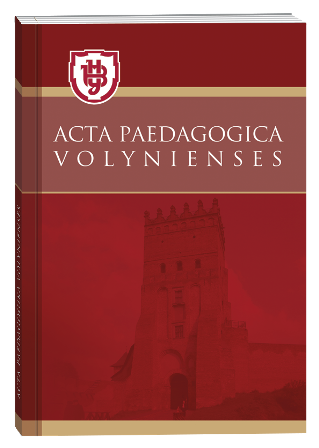ІНТЕГРАЦІЯ СОЦІАЛЬНО-ЕМОЦІЙНОГО НАВЧАННЯ У РАННЮ ДВОМОВНУ ОСВІТУ ДІТЕЙ ДОШКІЛЬНОГО ВІКУ
DOI:
https://doi.org/10.32782/apv/2025.3.3Ключові слова:
соціально-емоційне навчання (SEL), предметно-мовне інтегроване навчання (CLIL), двомовна освіта, країни ЄС, діти дошкільного вікуАнотація
У статті розглянуто сучасні тенденції дошкільної освіти у країнах ЄС. Зокрема, це соціально-емоційне навчання і двомовна освіта, які успішно інтегруються та мають спільні методи й технології навчання. Дослідження нейронауки беззаперечно доводять необхідність раннього соціально-емоційного навчання дошкільників з метою формування у них соціально-емоційної грамотності, розвитку у майбутньому просоціальної поведінки та вмінь проявляти емпатію і толерантність. Набуття дітьми таких компетентностей має пролонгований вплив і забезпечує емоційне благополуччя та психічне здоров’я у подальшому житті. Водночас із впровадженням соціально-емоційного навчання існує нагальна потреба у двомовній освіті дітей дошкільного віку, коли вони одночасно вивчають рідну і іноземну мову. У країнах ЄС активно просувається предметно-мовне інтегроване навчання іноземної мови у ранній освіті дітей дошкільного віку. Науковцями доведено, що формування соціально-емоційних компетентностей у дошкільників під час впровадження предметно-мовного інтегрованого навчання є досить ефективним за рахунок спільних методів: використання ігрових технологій та візуальних матеріалів, діалогічне навчання, командна взаємодія, емоційна підтримка й мотивація. Результативним інструментом для соціально-емоційного та предметно-мовного інтегрованого навчання є рухові активності дошкільників (заняття з фізичної культури, руханки, танці, драматизації), що сприяють розвитку вольових рис характеру дітей, їх командній взаємодії та покращенню інтерналізації, тобто процесу прийняття цінностей дитячої групи. Євроінтеграційні процеси в Україні вказують на необхідність впровадження двомовної освіти у поєднанні з соціально-емоційним навчанням в освітній процес закладів дошкільної освіти. Подальші наукові розвідки стосуватимуться створенню та впровадженню ефективної моделі формування соціально-емоційної грамотності дітей старшого дошкільного віку у двомовних групах ЗДО України.
Посилання
Andúgar A., & Cortina-Pérez B. EFL teachers’ reflections on their teaching practice in Spanish preschools: A focus on motivation. Preschool Bilingual Education. 2018. Pp. 219–244. DOI: 10.1007/978-3-319-77228-8_8
Bierman K. L., & Motamedi M. Social and emotional learning programs for preschool children. In J. Durlak, C. Domitrovich, R. P. Weissberg, & T. Gullotta (Eds.). Handbook of social and emotional learning: Research and practice, 2015, pp. 135–151.
Center on the Developing Child at Harvard University. From Best Practices to Breakthrough Impacts: A Science- Based Approach to Building a More Promising Future for Young Children and Families, 2016. http://www.developing- child.harvard.edu
Collaborative for Academic, Social, and Emotional Learning. CASEL. Retrieved September 20, 2021. https:// casel.org/
Denham S. A., & Bassett H. H. Early childhood teachers’ socialization of children’s emotional competence. Journal of Research in Innovative Teaching & Learning, 12(2), 133–150, 2019. https://doi.org/10.1108/JRIT-01-2019-0007
Denham S. A., Bassett H. H., Zinsser K., & Wyatt T. M. How preschoolers’ social–emotional learning predicts their early school success: Developing theory-promoting, competency-based assessments. Infant and Child Development, 23(4), 2014, 426–454. https://doi.org/10.1002/icd.1840
Durlak J., Weissberg R., Dymnicki A., Taylor R. & Schellinger K. The impact of enhancing students’ social and emotional learning: A meta-analysis of school-based universal interventions. Child Development, 82(1), 2011, 405–432. http://www.jstor.org/stable/29782838
Eurydice. Content and Language Integrated Learning (CLIL) at school in Europe. 2006. https://op.europa.eu/en/ publicationdetail/-/publication/756ebdaa-f694-44e4-8409-21eef02c9b9b
Ingemarson M., Rosendahl I., Bodin M. & Birgegard A. Teacher’s use of praise, clarity of school rules and class- room climate: Comparing classroom compositions in terms of disruptive students. Social Psychology of Education, 23(1), 2019, pp. 217–232. https://doi.org/10.1007/s11218-019-09520-7
Jennings P. A., & Greenberg M. T. The prosocial classroom: teacher social and emotional competence in rela- tion to student and classroom outcomes. Review of Educational Research, 79(1), 2009, pp. 491–525. https://doi.org/ 10.3102/0034654308325693
Jones D. E., Greenberg M. & Crowley M. Early social-emotional functioning and public health: the relation- ship between kindergarten social competence and future wellness. American Journal of Public Health, 105(11), 2015, pp. 2283–2290. https://ajph.aphapublications.org/doi/full/10.2105/AJPH.2015.302630
Kahn J., Bailey R. & Jones S. Coaching social & emotional skills in youth sports. Aspen Institute. 2019. http://files.eric.ed.gov/fulltext/ED603548.pdf
Laible D., Carlo G., Murphy T., Augustine M.& Roesch S. Predicting children’s prosocial and co-operative behavior from their temperamental profiles: A person-centered approach. Social Development, 23(4), 2014, pp. 734–752. https://doi.org/10.1111/sode.12072
Maccari S., Krugers H., Morley-Fletcher S., Szyf M. & Brunton P. The Consequences of Early-Life Adversity: Neurobiological, Behavioural and Epigenetic Adaptations. Journal of Neuroendocrinology, 26(10), 2014, pp. 707–723.
Kalland Mirjam M. & Linnavalli T. Associations Between Social-Emotional and Language Development in Preschool Children. Results from a Study Testing the Rationale for an Intervention, Scandinavian Journal of Educational Research, 67:5, 2023, pp. 791–804. DOI: 10.1080/00313831.2022.2070926
Mortimore L. CLIL and Social and Emotional Learning in Early Bilingual Education: Compatible and Mutually Beneficial. Journal of Language Teaching and Research, Vol. 14, No. 4, 2023, pp. 903–911. DOI:https://doi.org/10.17507/jltr.1404.06
Pakarinen E., Lerkkanen M. & Von Suchodoletz A. Teacher emotional support in relation to social competence in preschool classrooms. International Journal of Research & Method in Education, 43(4), 2020, pp. 444–460.
Sim F., O’Dowd J., Thompson L., Law J., Macmillan S., Affleck M., Gillberg C.& Wilson P. Language and social-emotional problems identified at a universal developmental assessment at 30 months. BMC Pediatrics, 13(1), 2013, p. 206. https://doi.org/10.1186/1471-2431-13-206
##submission.downloads##
Опубліковано
Як цитувати
Номер
Розділ
Ліцензія

Ця робота ліцензується відповідно до Creative Commons Attribution 4.0 International License.







